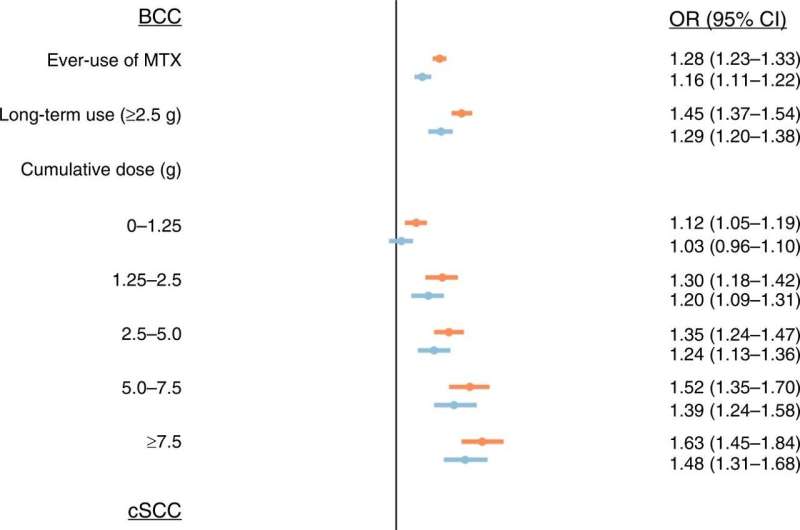This article has been reviewed according to Science X's editorial process and policies. Editors have highlighted the following attributes while ensuring the content's credibility:
fact-checked
peer-reviewed publication
trusted source
proofread
Study finds use of methotrexate is associated with an increased risk of skin cancer

The immunosuppressive drug methotrexate (MTX) can be linked to an elevated risk of three types of skin cancer, a new study by University of Gothenburg researchers shows. Patients receiving the drug include those with moderate to severe psoriasis; but in this particular patient group, a risk increase was only observed for basal cell carcinoma.
The study, based on Danish health care registers, was a result of a research collaboration with the University of Southern Denmark, Aarhus University and the University of Copenhagen. The scientists identified patients born in any of the Nordic countries who, between 2004 and 2018, were diagnosed with one of three types of skin cancer: basal cell carcinoma (BCC, 131,447 patients), squamous cell carcinoma (SCC, 18,661 patients), and cutaneous malignant melanoma (CMM, 26,068 patients). Every patient with skin cancer was compared with ten age and sex matched controls.
Minor risk for individual
The results are published in the British Journal of Cancer, and the study shows that, at a group level, it was more common for patients who developed any of the three types of skin cancer, to have been treated with MTX previously. This rise in risk is presented in the study as a range: 20–38% for BCC, 37–89% for SCC, and 13–61% for CMM. The researchers also demonstrate that patients who had used higher doses of MTX were at higher risk for SCC and BCC. In contrast, no distinct dose–response relationship was observed for CMM.
The study's first author, Sam Polesie, is an associate professor of dermatology and venereology at Sahlgrenska Academy, University of Gothenburg, and dermatologist at Sahlgrenska University Hospital. He points out that the study's findings should not be used at individual level.
"MTX is an effective and important medicine that helps lots of patients. The absolute risk for an individual patient of developing any of these skin cancer types remains small even if they use the drug. However, since MTX is a quite frequently used drug, our results may imply a rise in the number of skin cancer cases at the population level," Polesie says.
Psoriasis shows different picture
When the researchers confined the study to patients with psoriasis, they found no statistical correlation linking MTX to a raised SCC or CMM risk. However, a rise in BCC risk remained.
"You could interpret this as a weakness in the study. It's possible that the statistical analyses conceal some type of bias that was evident among patients with psoriasis, but we can only speculate about that. These results might also be interpreted as reassuring to dermatologists who mainly use MTX as the first line therapy of systemic drugs to treat patients with moderate to severe psoriasis," Polesie says.
"Patients with psoriasis probably have divergent sun exposure habits. Moreover, historically light therapy used to be a common treatment to treat psoriasis. Sun exposure habits and use of light therapies were examples of important factors we weren't able to include in the study."
Individual background factors weighed in
MTX is an often used and valuable immunosuppressive drug used to treat several inflammatory and autoimmune diseases. Used since the 1950s, MTX still constitutes an important drug particularly in the dermatology and rheumatology treatment armamentarium, since it is mainly prescribed for patients with rheumatoid arthritis and psoriasis.
Before physicians prescribe MTX, routine tests are always obtained to verify that the patient has no underlying liver or kidney disease. Simultaneously, in assessing the benefit the medicine is expected to confer, the prescribing physician always weighs in the patient's medical condition and history.
In the past few years, several epidemiology investigations have examined if MTX is associated with an elevated risk of skin cancer, but the research findings to date have been somewhat contradictory.
"So this study is another contribution to the ongoing discussion about MTX and its association with skin cancer. It's important remain vigilant and to keep studying the associations between well-established drugs, on the one hand, and their links with cancer on the other," Polesie says.
More information: Sam Polesie et al, Use of methotrexate and risk of skin cancer: a nationwide case–control study, British Journal of Cancer (2023). DOI: 10.1038/s41416-023-02172-7

















